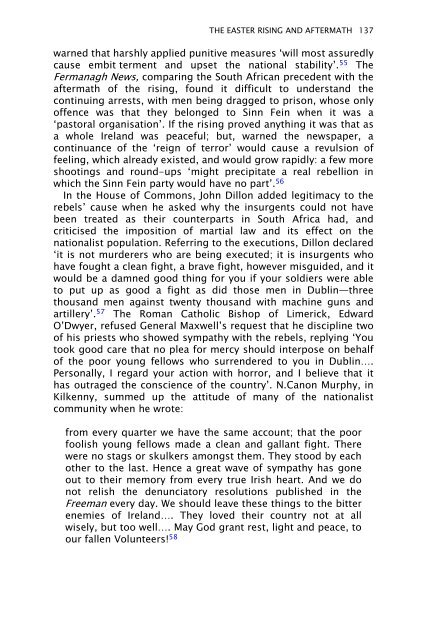Dividing Ireland: World War I and Partition
Dividing Ireland: World War I and Partition
Dividing Ireland: World War I and Partition
Create successful ePaper yourself
Turn your PDF publications into a flip-book with our unique Google optimized e-Paper software.
THE EASTER RISING AND AFTERMATH 137<br />
warned that harshly applied punitive measures ‘will most assuredly<br />
cause embit terment <strong>and</strong> upset the national stability’. 55 The<br />
Fermanagh News, comparing the South African precedent with the<br />
aftermath of the rising, found it difficult to underst<strong>and</strong> the<br />
continuing arrests, with men being dragged to prison, whose only<br />
offence was that they belonged to Sinn Fein when it was a<br />
‘pastoral organisation’. If the rising proved anything it was that as<br />
a whole <strong>Irel<strong>and</strong></strong> was peaceful; but, warned the newspaper, a<br />
continuance of the ‘reign of terror’ would cause a revulsion of<br />
feeling, which already existed, <strong>and</strong> would grow rapidly: a few more<br />
shootings <strong>and</strong> round-ups ‘might precipitate a real rebellion in<br />
which the Sinn Fein party would have no part’. 56<br />
In the House of Commons, John Dillon added legitimacy to the<br />
rebels’ cause when he asked why the insurgents could not have<br />
been treated as their counterparts in South Africa had, <strong>and</strong><br />
criticised the imposition of martial law <strong>and</strong> its effect on the<br />
nationalist population. Referring to the executions, Dillon declared<br />
‘it is not murderers who are being executed; it is insurgents who<br />
have fought a clean fight, a brave fight, however misguided, <strong>and</strong> it<br />
would be a damned good thing for you if your soldiers were able<br />
to put up as good a fight as did those men in Dublin—three<br />
thous<strong>and</strong> men against twenty thous<strong>and</strong> with machine guns <strong>and</strong><br />
artillery’. 57 The Roman Catholic Bishop of Limerick, Edward<br />
O’Dwyer, refused General Maxwell’s request that he discipline two<br />
of his priests who showed sympathy with the rebels, replying ‘You<br />
took good care that no plea for mercy should interpose on behalf<br />
of the poor young fellows who surrendered to you in Dublin….<br />
Personally, I regard your action with horror, <strong>and</strong> I believe that it<br />
has outraged the conscience of the country’. N.Canon Murphy, in<br />
Kilkenny, summed up the attitude of many of the nationalist<br />
community when he wrote:<br />
from every quarter we have the same account; that the poor<br />
foolish young fellows made a clean <strong>and</strong> gallant fight. There<br />
were no stags or skulkers amongst them. They stood by each<br />
other to the last. Hence a great wave of sympathy has gone<br />
out to their memory from every true Irish heart. And we do<br />
not relish the denunciatory resolutions published in the<br />
Freeman every day. We should leave these things to the bitter<br />
enemies of <strong>Irel<strong>and</strong></strong>…. They loved their country not at all<br />
wisely, but too well…. May God grant rest, light <strong>and</strong> peace, to<br />
our fallen Volunteers! 58








